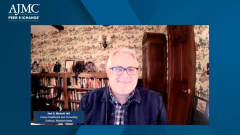
Coverage for Complement Therapies for Cold Agglutinin Disease
Payers debate criteria for coverage of novel targeted therapies under investigation as use as novel complement therapy for cold agglutinin disease.
Episodes in this series

Neil Minkoff, MD: I want to bring our payers back in, because we had a conversation just a few minutes ago talking about a reasonable lack of control on rituximab, daratumumab ,and other similar drugs that were being used here, even if not on label, for a rare indication where there's data to support it. Both of you indicated that it was easier, I think one you said that it was easier because it was episodic therapy. Now, if we're talking about a more extended period of time, every 2 weeks, for a while, maybe in perpetuity, does that change your management style? Does that make you think about this differently? Or do you say, "It's 5 in a million, these are hard to treat patients, how much barrier can we put on it?"
Kevin Stephens Sr, MD, JD: I can tell you a statement I heard once. If you are in the payer's market and you can't count pennies, you are not going to be in business very long. We have to look at everything, outcomes and the whole big picture, and so if a patient's having a protracted, severe illness, then at that point, we will start to say, "What else can we do to assist?" Are there triggers, are there environmental things, are there medications, and other medications? All of those kinds of things we would throw in the case management and disease management component to help with the utilization because, obviously, if you're having this treatment over a protracted, long period of time, that is problematic. Sure, the patient is going through some challenges, and the family's going through challenges, so we look at the mental health support care. How is the patient and their family dealing with this? We have psychiatrists and behavioral health specialists that will come in and we can have them do the behavioral health component because we know that also, if you're feeling depressed and you're down and so forth, then that can ultimately affect your impression on your prognosis and your well-being.
Neil Minkoff, MD: Dr Gleeson?
Jeremy Gleeson, MD: I can see a scenario where we have perhaps this new complement-based drug eventually getting FDA approval, whereas the other treatments we've heard about don't, but it does seem that they may be more appropriate to use first based on the shorter duration of treatment, and also the fact that they probably deal with the cold symptoms more effectively than the complement-based drug. In that scenario, where the FDA-approved drug may not be the best first choice, and I think we'll have to deal with that and not go straight strictly with FDA approval as the primary guideline for what we would recommend. I can see that we would want to be able to approve the current drugs that are not FDA approved, perhaps ahead of the potentially FDA-approved drug in the future. Once again, I think we just have to look at the data and along with our clinical colleagues, come up with what seems to be the most clinically appropriate course of action.
Kevin Stephens Sr, MD, JD:We would just see if there was a failure of treatment or an inadequate treatment of the earlier treatments, as opposed to the newer drugs that the FDA approved. Thus, yes, we work in conjunction with experts and panelists and providers to work with them to make sure that we do the best thing for the patients.
Neil Minkoff, MD: To my clinical colleagues, do you think it would be reasonable, maybe not advised, but reasonable, for a payer to say that as the new complement therapies come to market, they would want to reserve these for patients who had failed or not shown enough improvement, shall we say, in a rituximab combination, patients who were on rituximab who couldn't tolerate other medications, or maybe even another drug like a daratumumab?
Jeremy Lorber, MD: I think it's reasonable. I wouldn't go as far as the second proposition with also requiring a failure of a drug such as daratumumab just because daratumumab and bortezomib, which we discussed, have some data, but it's very small. I think the data for the novel agents is much stronger than those 2, but not stronger than rituximab-based regimens. I think a failure of rituximab-based regimens is reasonable to require. Beyond that, I wouldn't make other steps before a novel agent.
Mihir Raval, MD, MPH: I agree. I think the only caveat that I would add would be patients are very well educated. They do their own research. Now, if you have a patient that comes and demands this treatment, and if it is a preapproved drug, now I can see that can be sometimes challenging to try to convince them if the company denies that request. Daratumumab is also not finite; sometimes daratumumab, you may have to continue that for long term and that adds in other complications. For example, Darzalex causes actual red cell agglutination issues, so now you have an added complication of giving somebody a blood product that may be least incompatible because it adds that extra layer of complications on how the type and screen works when you give somebody Darzalex or daratumumab.
Transcript edited for clarity.
Newsletter
Stay ahead of policy, cost, and value—subscribe to AJMC for expert insights at the intersection of clinical care and health economics.










